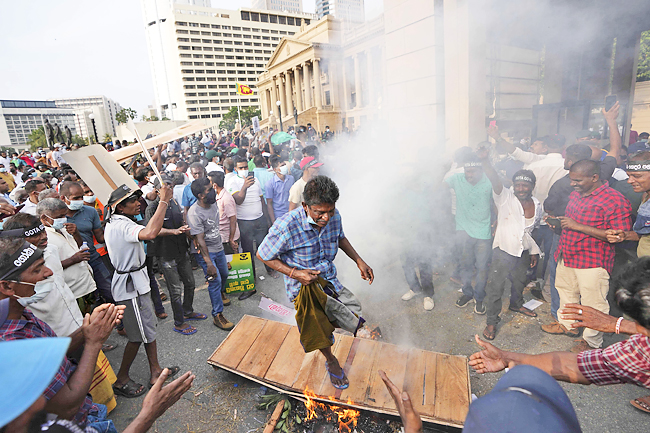COLOMBO, SRI LANKA (AP) – Sri Lanka’s president said on Wednesday that his government was in discussions with the International Monetary Fund (IMF), other agencies and countries on deferring loan repayments and requested people’s support by limiting electricity and fuel consumption to cope with the worst economic crisis in memory.
President Gotabaya Rajapaksa in his televised address asked the nation not to be discouraged and have faith in his steps to salvage the situation. His appeal comes amid widespread public anger at the severe shortages of essential goods including medicine, cooking gas, fuel and daily power cuts.
He said the government has initiated talks with international financial institutions and “friendly countries regarding repayment of our loan instalments”.
“Yesterday’s discussion with the IMF was also held for this purpose,” he said.
His government’s decision to deal with the IMF marks a policy shift after it had resisted calls from experts and politicians to seek the agency’s help. It had argued that asking international financial institutions for assistance could bring along conditions detrimental to the country’s interests.
Sri Lanka’s usable foreign reserves are said to be less that USD400 million, according to experts, and it has nearly USD7 billion in foreign debt obligations for this year.

The dollar shortage has led to authorities struggling to pay for shiploads of fuel, cooking gas and food items docked at Colombo port. At the same time, people and vehicles were forming long lines near gas stations and cooking gas dealers for hours.
Finance Minister Basil Rajapaksa was currently in India, where he is expected finalise a USD1 billion credit line to buy essential supplies.
Rajapaksa said that along with his decision to free float the local currency and positive signs about a revival of tourism and exports after a respite in the COVID-19 pandemic, he expects a better inflow of foreign currency and hopes the deficit can be managed at around USD2.4 billion this year.
Rajapaksa said fuel makes up about 20 per cent of Sri Lanka’s total imports. Recent sharp rises in fuel prices were the result of the increase of crude oil prices globally, he said.
“Therefore, by limiting the use of fuel and electricity as much as possible, the citizens too can extend their support to the country at this time. I hope that you will understand the responsibility lies with you at this challenging time,” he said.
Political parties and citizen groups have launched protests around the country, accusing the government of being responsible for the economic crunch. The main opposition party in Sri Lanka’s Parliament held a demonstration near the president’s office on Tuesday demanding Rajapaksa’s resignation.


